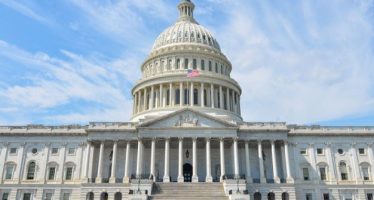Few Strings in US, Many in Europe
 As trillions of dollars and euros were being doled out in state aid by governments and central banks trying to buy their way out of a recession, some of the cash ended in the wrong pockets. This morning, The New York Times reported that twenty large US healthcare providers pleading poverty received some $5 billion in federal aid whilst sitting atop a $100 billion cash pile.
As trillions of dollars and euros were being doled out in state aid by governments and central banks trying to buy their way out of a recession, some of the cash ended in the wrong pockets. This morning, The New York Times reported that twenty large US healthcare providers pleading poverty received some $5 billion in federal aid whilst sitting atop a $100 billion cash pile.
A study conducted at the request of the Kaiser Family Foundation, a think tank for health-related policy issues, found that hospitals catering mostly to well-insured and wealthier patients received on average twice the amount of financial support as those serving low-income communities.
Most of the country’s largest healthcare providers, including the main beneficiaries of federal support, are registered as non-profit organisations, prompting Congressman Frank Pallone (D-NJ) to wonder why these entities have accumulated vast cash reserves if not to meet an emergency.
Last year, Providence Health & Services, founded in 1859 and currently operating 51 hospitals and over 1,100 other medical facilities, generated about $1.3 billion in profits from a cash reserve estimated at $12 billion invested in hedge funds, private equity, and real estate. Providence pays no federal taxes on its earnings yet managed to pocket $509 million in emergency grants from the Department of Health and Human Services which has so far spent more than $72 billion to bail out supposedly struggling healthcare providers with another $28 billion to follow shortly.
The speed and ferocity with which the corona virus struck required a like official response. Most of the usually applied due diligence had to be ditched in order to provide the levels and volumes of cash needed. Under such circumstances, mistakes were all but inevitable – and not exclusive to the US.
In Europe, governments sourced and released untold billions to support privately-owned businesses that saw revenue slashed overnight by half or more. Yesterday, German taxpayers became a major stakeholder in Lufthansa, the country’s flag carrier. The company received €9 billion ($9.8bn) in state funds in return for a 20 percent equity share. The government will furnish €5.7 billion in fresh cash and guarantee €3.3 billion in loans from the state-owned FdW development bank. The German government also has the option to increase its stake to 25 percent in order to block any takeover attempt.
After adhering for decades on end to a particularly strict interpretation of laissez faire principles, the British government is now also openly considering taking charge of private enterprise. Chancellor Rishi Sunak is working on plans to save strategically crucial businesses whose failure may harm the economy ‘disproportionally’.
The first sectors under consideration for expanded state aid include the aerospace, steel, and automotive industries. Under ‘Project Birch’, the UK government may acquire an equity stake in iconic companies, to be sold at a profit once the economy has recovered. This partial and possibly temporary renationalisation of British industry is meant to preserve whatever is left of the country’s much diminished and mostly foreign-controlled industrial base.
Taboo topics, such as support for long-suffering UK steel mills, have become fashionable. Tata Steel Europe has requested up to £500 million in state funds to support its operations in the country, most of which have long failed to turn a profit. The Indian-owned company is in a particularly difficult spot since it leans heavily on the profits generated by its subsidiary in The Netherlands which, under a new corporate plan, is expected to pay out over €100 million annually to the British mills. Tata Sons, the holding company, announced earlier this month that it is no longer able or willing to financially support its European businesses.
Management and workers of the IJmuiden steelworks are now in open rebellion against the company’s owners after they announced redundancies and cutbacks in order to keep the fires burning at the troubled UK mills. British employee representatives on the supervisory board of the company have walked out angrily in protest against the perceived lack of solidarity shown by their Dutch counterparts, leading to a near-complete breakdown in relations between both divisions of the company.
The managing director of the IJmuiden plant was summarily fired last week for refusing to carry out the instructions of the Indians, sparking wildcat strike action and appeals to The Hague for the renationalisation of the mill. The director had been asked to fire up to 1,250 employees and remit the resulting savings to the UK.
To extricate itself from this political minefield, Tata Steel Europe is reportedly planning to demerge its European operations into two separate companies. The Dutch government has signalled that it may not allow the IJmuiden plant and its 9,000 workers to be used as a crutch to support Tata Steel Europe’s loss-making British operations. Conversely, before releasing any bail out cash, the British government seeks assurances that the money will stay in the UK. Similar conditions have been attached to Dutch state aid.
Tata Steel Europe has reportedly resumed talks with German conglomerate Thyssenkrupp, Europe’s second largest steel producer, to explore a possible merger. Earlier negotiations broke down after the European Commission voiced fears that a joining of both companies could run afoul of the bloc’s notoriously strict fair competition rules. In. May, Thyssenkrupp management announced its intention to sell parts of the business. Besides holding talks with Tata Steel Europe, the Germans are also exploring the interest expressed by Sweden’s SSAB and China’s Baoshan Iron & Steel.
As in The Netherlands, worker representatives hold half of the seats on the German company’s supervisory board and are expected to block a foreign takeover. Tekin Nasikkol, who represents the powerful IG Metall union on the board, warned that he can imagine ‘no scenario’ that would convince the group’s labour representatives to approve a sale.
The Corona recession has put almost everybody on edge and unhinged to balance of power between business, labour, and government. Whilst in the US private enterprise seems to remain firmly in control, European corporations appealing for state financial support face increased scrutiny and a long list of conditions.
In return for €4 billion in state aid, Dutch flag carrier KLM has to ‘green’ operations, hold back on layoffs, stop all dividend payouts, and curtail executive remuneration. To get its €3 billion, Air France had to promise to phase out its domestic network in order to boost train travel.
Amongst the continent’s largest carriers, British Airways and Spain’s Iberia have landed a predicament not dissimilar to the one plaguing Tata Steel. Both companies plus Irish Air Lingus and low-cost carrier Vueling are owned by the International Airline Group (IAG) with shares and management positions almost equally held by British and Spanish interests. The UK’s departure from the EU has complicated matters considerably with the EU reluctant to provide aid and national governments eager to salvage only ‘their bit’ of the group.
Whilst Iberia has applied to the Spanish government for €900 million in state-backed loan guarantees, British Airways has preferred to wing it under its own power. Some 36,000 of BA’s 45,000 employees have been furloughed with 12,000 expected to be dismissed. BA CEO Alex Cruz deplored the UK government’s decision to decree a two-week quarantine period for all visitors arriving in the country, comparing the move to a death knell for the industry. Although the UK government is considering ways to help BA stay aloft, the company has not yet formalised any request for state aid. The airline is, however, included in the ‘Project Birch’ roster of companies too important to fail alongside Virgin Atlantic which earlier failed to secure significant government support. The British state may yet come to own an airline or two.
You may have an interest in also reading…
Lessons from China
For the first time in nearly half a century China’s economy has stopped growing. The National Bureau of Statistics (NBS)
When It Pours, Rainy Day Funds Help – A Little
Both the United States and the United Kingdom have joined the increasingly crowded ranks of countries sustaining a debt load
Separating the Wheat from the Chaff
Scale, speed, and simplicity. In order to have a discernible effect, measures taken to alleviate the impact of the corona















































































